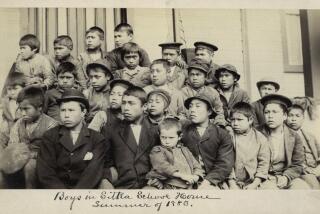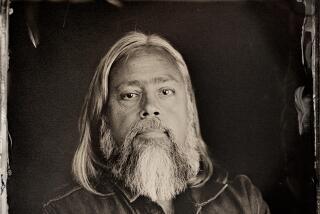BOOK REVIEW : Nordic Tale Woven Into Lore of Indians : THE VOICE OF THE EAGLE<i> by Linda Lay Shuler</i> ; William Morrow $22; 640 pages
In her first novel, “She Who Remembers,” Linda Lay Shuler rekindled lost civilizations of the pre-Columbian southwest to tell a tale of romance and mystical adventure and to ponder what legacy 11th-Century Viking explorers might have left behind.
From her extensive research of the Anasazi Indians, a southwestern Pueblo culture that mysteriously vanished near the end of the 13th Century, Shuler rendered a setting rich in ancient imagery and a remarkable cast of unsuspecting natives. As for the Viking legacy the author conjured her heroine, Kwani.
As we recall, Kwani was a beautiful, blue-eyed woman, raised by the Anasazi but outcast as a witch into the wilderness where she endured the torment of marauding nomads. Near death, Kwani was rescued by the marvelously portrayed character, Kokopelli.
He is Toltec, cultural forbearers to the Aztecs, and, to his amusement, has long been revered among the Pueblo tribes as a fertility god. He and Kwani journey to the remote Anasazi Place of the Eagle Clan. There Kwani is bestowed an ancient honor by the tribal elders. She is chosen to become the keeper of the sacred wisdom of woman.
But Kwani fell from favor and was again outcast.
Now the sequel, “The Voice of the Eagle,” opens with her abandonment by Kokopelli who leaves her “ . . . with treasures. And memories.” But Kwani is never long without a man and soon takes up with Tolonqua, who inspires a change of setting.
Tolonqua is Towa from the Pueblo city of Cicuye, or more accurately, of “ . . . the Paequiu (or Paequiula) tribe, known today as the People of Pecos Pueblo.” Shuler’s restorations of the ancient city and its inhabitants are as finely crafted and meticulously detailed as the landscapes of her previous novel.
The people of Cicuye define their lives according to ancient traditions and align their destinies with the will of spirit gods but still find time for plenty of greed, lust, envy and revenge. It’s like taking the cast of “All My Children” for a primal romp.
The Towa are reluctant to embrace the blue-eyed stranger and, again, Kwani must struggle for honor and acceptance. But at length, after much supernatural subterfuge, truth-divining rituals, Plains Indian attacks, and message-bearing coyotes, Kwani is recognized as She Who Remembers, the mystical keeper of female wisdom.
She becomes a teacher of these sacred traditions to skeptical young girls who come to her “giggling behind their hands” and leave with “faces alight with understanding.”
Would the author have us believe that the girls remained unfamiliar with their own mythology and female deities upon which much of their culture is based, until the chance arrival of the blue-eyed one?
And what of Shuler’s chieftains and medicine men who relentlessly malign women? “How can we know . . . ,” one man asks another of a recent event, “what really happened when we have only the word of women?” These are recurring themes that wander far from American Indian belief.
Many years pass and, though she has remained in Cicuye, Kwani still seeks a sense of identity she has never found among the Towa.
She returns to the Place of the Eagle Clan, now abandoned by the Anasazi “ . . . but for the spirits who linger.” There, the Ancient Ones whisper a dark prophecy of times to come before Kwani’s soul makes its final transformation.
Shuler’s work is preoccupied with American Indian idioms but rarely explores their meaning or significance to tribal belief. Characters spend much of their time pondering their relationship with nature and the sacredness of all life.
This is distinctly Indian, but after a time, becomes cliche. But Shuler is an accomplished storyteller who weaves a splendid tale. Her work is not an ethnological study of Indian culture. According to the author, “This is a book of fiction . . . “ and as such is wonderfully entertaining.
More to Read
Sign up for our Book Club newsletter
Get the latest news, events and more from the Los Angeles Times Book Club, and help us get L.A. reading and talking.
You may occasionally receive promotional content from the Los Angeles Times.









